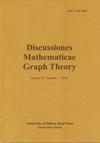Efficient (j, k)-Dominating Functions
IF 0.8
4区 数学
Q3 MATHEMATICS
引用次数: 0
Abstract
Abstract For positive integers j and k, an efficient (j, k)-dominating function of a graph G = (V, E) is a function f : V → {0, 1, 2, . . ., j} such that the sum of function values in the closed neighbourhood of every vertex equals k. The relationship between the existence of efficient (j, k)-dominating functions and various kinds of efficient dominating sets is explored. It is shown that if a strongly chordal graph has an efficient (j, k)-dominating function, then it has an efficient dominating set. Further, every efficient (j, k)-dominating function of a strongly chordal graph can be expressed as a sum of characteristic functions of efficient dominating sets. For j < k there are strongly chordal graphs with an efficient dominating set but no efficient (j, k)-dominating function. The problem of deciding whether a given graph has an efficient (j, k)-dominating function is shown to be NP-complete for all positive integers j and k, and solvable in polynomial time for strongly chordal graphs when j = k. By taking j = 1 we obtain NP-completeness of the problem of deciding whether a given graph has an efficient k-tuple dominating set for any fixed positive integer k. Finally, we consider efficient (2, 2)-dominating functions of trees. We describe a new constructive characterization of the trees with an efficient dominating set and a constructive characterization of the trees with two different efficient dominating sets. A number of open problems and questions are stated throughout the work.有效(j,k)-支配函数
摘要对于正整数j和k,图G=(V,E)的有效(j,k)支配函数是函数f:V→ {0,1,2,…,j}使得每个顶点的闭邻域中的函数值之和等于k。研究了有效(j,k)-支配函数的存在性与各种有效支配集之间的关系。证明了如果强弦图具有一个有效的(j,k)-支配函数,则它具有一个高效的支配集。此外,强弦图的每个有效(j,k)-支配函数都可以表示为有效支配集的特征函数的和。对于j
本文章由计算机程序翻译,如有差异,请以英文原文为准。
求助全文
约1分钟内获得全文
求助全文
来源期刊

Discussiones Mathematicae Graph Theory
MATHEMATICS-
CiteScore
2.20
自引率
0.00%
发文量
22
审稿时长
53 weeks
期刊介绍:
The Discussiones Mathematicae Graph Theory publishes high-quality refereed original papers. Occasionally, very authoritative expository survey articles and notes of exceptional value can be published. The journal is mainly devoted to the following topics in Graph Theory: colourings, partitions (general colourings), hereditary properties, independence and domination, structures in graphs (sets, paths, cycles, etc.), local properties, products of graphs as well as graph algorithms related to these topics.
联系我们:info@booksci.cn
Book学术提供免费学术资源搜索服务,方便国内外学者检索中英文文献。致力于提供最便捷和优质的服务体验。
Copyright © 2023 布克学术 All rights reserved.
京ICP备2023020795号-1
 京公网安备 11010802042870号
京公网安备 11010802042870号
京ICP备2023020795号-1

Book学术文献互助群
群 号:604180095

 求助内容:
求助内容: 应助结果提醒方式:
应助结果提醒方式:
